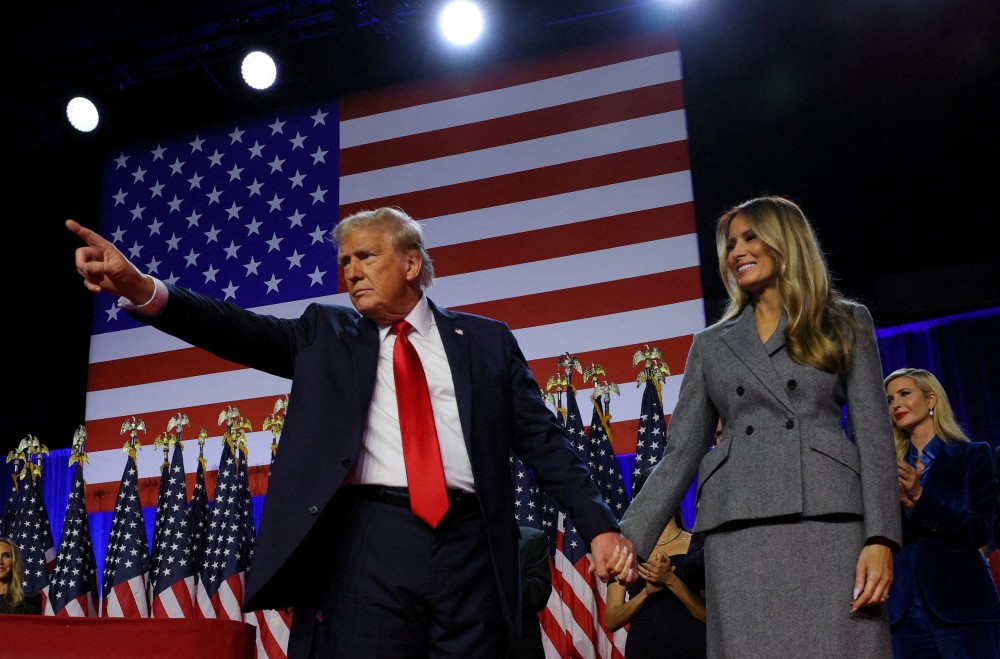
By Kate Scanlon
WASHINGTON (OSV News) — Former President Donald Trump was elected to a second term in the Oval Office four years after he lost his run for a second consecutive term, according to multiple projections.
Trump’s election Nov. 5 marks the conclusion of a tumultuous campaign season that included two assassination attempts against him, his original Democratic rival President Joe Biden stepping down in favor of Vice President Kamala Harris, and his own continued claims, without evidence, that the 2020 election was stolen from him.
“I want to thank the American people for the extraordinary honor of being elected your 47th president and your 45th president,” Trump told supporters in West Palm Beach, Florida, around 2:30 a.m. Nov. 6, adding, “This will truly be the golden age of America.”
Only one president, Grover Cleveland, has previously served nonconsecutive terms in the White House. Others including Martin Van Buren tried and failed to return to the White House.
Of the states seen as battlegrounds, Trump secured the electoral votes in battleground states including Georgia, North Carolina, Pennsylvania and Wisconsin, meeting the 270 threshold in the Electoral College to become president in January.
Catholic analysts who spoke with OSV News have pointed to areas of alignment and divergence with his platform and Catholic social teaching on issues ranging from abortion and in vitro fertilization to immigration to climate and labor.
Ohio Sen. JD Vance, Trump’s running mate, called Trump’s reelection “the greatest political comeback in the history of the United States of America.”
Trump quipped he “took a little heat” for choosing Vance, but “I knew the brain was a good one.”
Robert Schmuhl, professor emeritus of American studies at the University of Notre Dame in South Bend, Indiana, who critically observes the modern American presidency, told OSV News that Trump’s “message about illegal immigration and the state of the economy resonated with working-class voters, particularly Hispanic and Black males, and this new, emerging coalition is not only redefining the Republican Party but also strengthening Trump’s political standing.”
“His stand on issues and the policies he advocated appealed to large numbers of voters,” he said. “Nearly three-quarters of Americans are dissatisfied with the current direction of the country, according to exit polls. That number speaks volumes about the difficulties Kamala Harris faced. This was a change election, as were the presidential elections of 2016 and 2020. The big question now is whether the U.S. will remain as divided as it has been in recent years.”
Republicans were projected to win control of the U.S. Senate, after Ohio Republican candidate Bernie Moreno defeated the state’s Democratic incumbent Sen. Sherrod Brown, and West Virginia’s Republican Gov. Jim Justice was elected to the seat soon to be vacated by Sen. Joe Manchin, a Catholic and the Senate’s last pro-life Democrat.
In a statement, Sen. John Thune, R-S.D., currently the minority whip and now in the running to become the Republican majority leader in the Senate, said, “The Biden-Harris administration has forced the American people to endure four years of high prices, open borders, and chaos on the world stage.”
“Tonight, with Republicans reclaiming majority control of the U.S. Senate, we can begin to turn the page on this expensive and reckless chapter of American history,” Thune said. “As we wait for additional results, I am optimistic that President Trump will be successful, our majority will grow stronger, and we can continue our work together to create a safer and more secure
country for every American.”
Control of the U.S. House of Representatives was not yet clear by early Nov. 6.
The balance of power in Congress will have a major role in approving or blocking Trump’s agenda and nominees.
